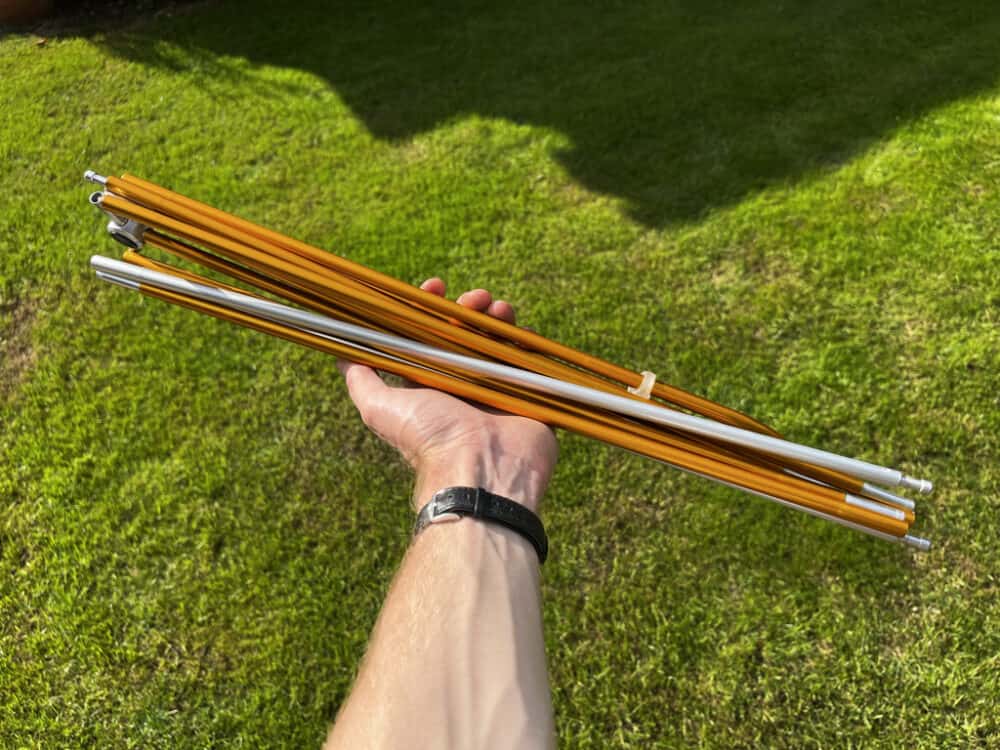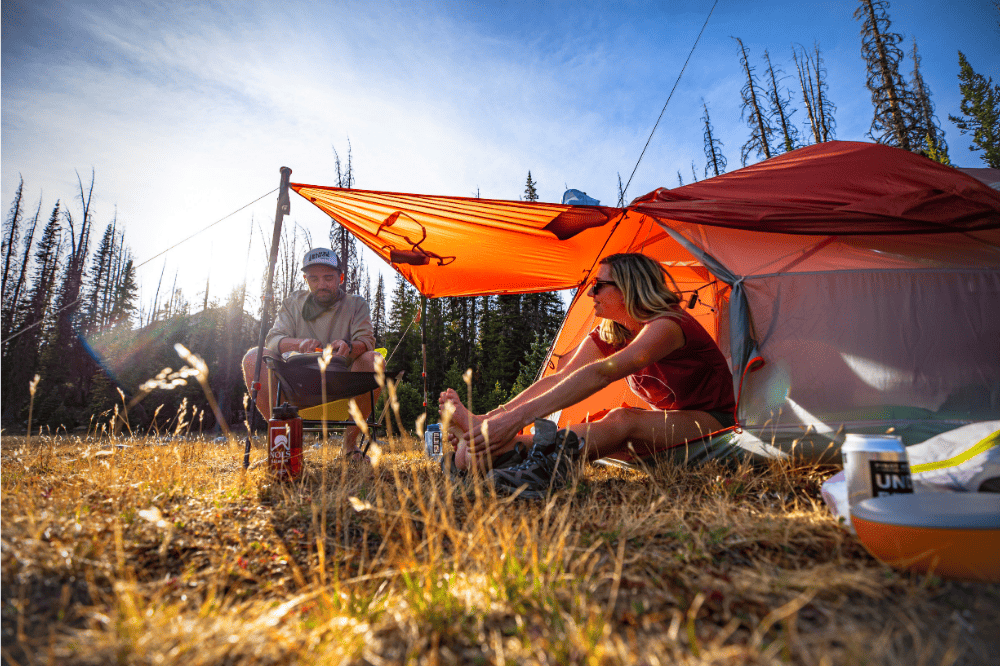Not sure about whether you should use fiberglass or aluminum poles for your tent? This handy guide will help you decide which material’s right for you and your shelter.
Aluminum vs Fiberglass Tent Poles – Which Should You Use?
If you’re going camping in the backcountry (or carrying your tent on your back anywhere), pick a tent with aluminum poles. Though they’re slightly more expensive, they’re less likely to break in any inclement weather you may face and also weigh less – resulting in a more pleasant journey to camp for you and your backpack.
Though they’re less able to resist strong weather conditions, tents with fiberglass poles are fine for some casual camping in fine weather conditions. If you’re looking for a cheaper tent that you’re not planning on carrying into the backcountry, a tent with fiberglass poles could be the one for you.
Aluminum tent poles: pros and cons
- Lighter and stronger than fiberglass
- Robust in strong winds and cold weather
- Aluminum bends rather than shatters – meaning it’s easier to repair
- An ideal choice for both backpackers or heavier car camping-style tents
- More expensive than fiberglass
Fiberglass tent poles: pros and cons
- Cheaper (great for casual camping/car camping trips)
- No possibility of corrosion
- Doesn’t conduct electricity (less danger from lightning)
- Fiberglass is more brittle than aluminum, so more likely to snap under pressure (not great for backpacking trips/backcountry camping)
Affordability
Winner: Fiberglass
Fiberglass poles are cheaper to produce than aluminum poles – and as a result, most popular casual camping tents which focus on low cost materials use fiberglass tent poles.
The low cost of a fiberglass tent pole doesn’t necessarily make them any worse than aluminum – they’re just not appropriate in every situation. If you’re doing some casual camping in summer, your camping trip is still likely to go without a hitch if you choose poles made of fiberglass; provided you’re not expecting heavy rain or wind. If you’re expecting inclement weather, I’d go for a tent with aluminum poles.
Indeed the higher production cost of aluminum poles is a major contributor to the higher cost of hiking and backpacking tents over car camping tents (that often use fiberglass poles).
You are also unlikely to find fiberglass tent poles in backpacking tents. A backpacking tent needs a strong structure that can stand up to intense winds and heavy snow loads.
Weight
Winner: Aluminum
The weight of your tent poles isn’t really a necessary consideration if you’re car camping – but if you’re backpacking (and having to carry your tent with you) then weight and portability are things you’ll want to keep in mind.
Aluminum poles are lighter than fiberglass poles and are found much more often in backpacking tents.
Many backpacking tents opt for the more expensive DAC aluminum poles for their tent.
DAC is the leading tent pole manufacturer and has progressively cut the weight of tent poles while maintaining their strength. They predominantly focus on aluminum poles but the lightest tent poles they offer – the DAC Featherlite NSL aluminum poles – are an aluminum alloy.

Durability
Winner: Aluminum
Aluminum poles are stronger and lighter than fiberglass poles – so they’re a much better choice for backpacking tents. If too much force is applied to aluminum poles, then they’ll just bend. This is not too difficult to repair.
Fiberglass poles, on the other hand, are heavier, quite brittle and tend to snap under too much pressure. As a result, they’re much more appropriate to use whilst car camping.
As strong winds or heavy snow can add a large amount of stress on tent poles, the last thing you want when you’re spending a night outside is a fractured, unrepairable fiberglass tent pole. That’ll leave you without a fully-functioning shelter, and you’ll be putting yourself in danger.
As fiberglass isn’t as strong as aluminum,you’ll typically only see fiberglass poles in 2 season tents (i.e. summer and fair weather) (or, rarely, some 3 season tents (to be used only in fair weather or standard rain and wind). You won’t see fiberglass poles being used in any tents designed to be used in worse conditions than these.
As the weight of canvas (and larger tents in general) puts more stress on the poles, you’re much more likely to see larger tents and canvas tents using aluminum tent poles.
Corrosion resistance
Winner: Fiberglass
As there’s no metal in fiberglass, poles made from fiberglass won’t corrode or rust.
Aluminum, on the other hand, is a metal, so corrosion and rust problems can occur over time (though some aluminum poles do come with a protective coating which can help reduce the likelihood of these issues).
Corrosion can become more of a risk if the tent poles aren’t dried fully after a rainy night or if you’re camping by the beach. To help prevent corrosion on your aluminum tent poles, ensure they’re completely dry after camping trips (including from condensation or dew).
